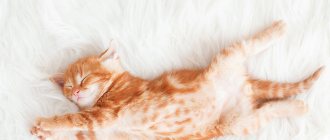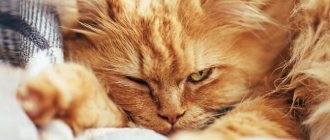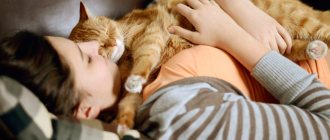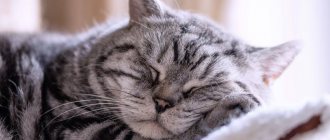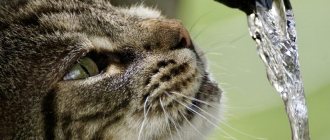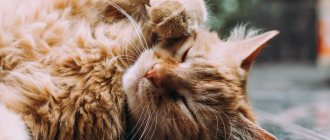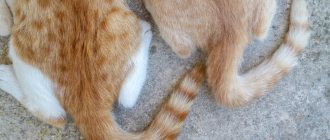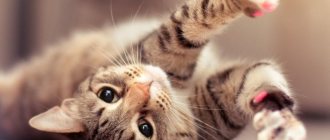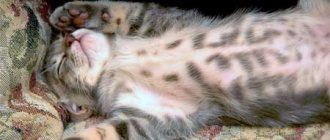What can your cat's sleeping position tell you about? We study cat psychology and learn to understand body language.
What can a cat's sleeping position tell you about? Unfortunately, people cannot understand the language of animals. They say that ancient sorcerers and shamans were able to understand the language of birds, animals, and even trees. Now people are unlikely to be able to do this. But the sleeping positions of cats will tell their owners a lot about the mood and condition of their beloved pet. If your beloved cat is sleeping, take a closer look at what position she is in.
Sleep norm for a cat
It’s worth starting with the fact that long sleep is considered normal for representatives of this species. Our pets are descendants of wild cats, and some habits remain in the blood of domesticated animals.
In nature, cats can sleep sweetly only after a successful hunt and on a full stomach. During rest, food is digested. If the animal is hungry, it falls asleep for a short time and sleeps restlessly.
In modern conditions of a comfortable life, pets do not need to spend a long time looking for food, because caring owners feed them regularly. The cat will spend more time digesting food, because he does not need to recuperate for hunting.
There is no single sleep standard for cats. It is believed that an individual can spend 12 to 16 hours sleeping per day. The duration of sleep depends on many factors: age, living conditions, temperament of the pet, health status and even its breed.
Age
The period of growing up requires an abundance of energy, so newborn kittens can sleep 20-22 hours a day, waking up only to snack. By three months they sleep 16-18 hours a day, and by the eighth month of life they begin to sleep like adults.
If you have an older pet over 8 years old, be prepared for him to spend more time sleeping to regain his strength.
Breed
Carefully bred breeds for domestic keeping are far removed from their wild ancestors and they retain less and less of the typical behavioral responses of a wild cat.
The British Shorthair, Maine Coon, and Siberian cats like to sleep longer. But emotional and active Abyssinians, Siamese cats, and Orientals will devote less time to rest.
Conditions of detention
In the cold season, animals tend to take a place near a heat source - they sleep better there, so their rest becomes longer. Some cats also react to the weather - when it’s cloudy outside, relaxation in the warmth lengthens. At the same time, if it is very hot outside, cats often rest for a long time, thanks to which they normalize their body temperature and cope with high temperatures.
If you pick up an animal on the street and are worried that it sleeps a lot, don’t worry, most likely, the pet is simply sleeping in a comfortable environment.
I invite you to watch a video that contains interesting facts about the duration of a cat’s rest:
What else affects sleep duration?
In addition to age, other internal factors, as well as some external ones, influence individual sleep duration. Because of this, pets of the same age require completely different amounts of time to rest.
Satiety
If a cat sleeps peacefully all day, then he does not feel hungry. He uses all this time to digest food. Animals that eat high-protein foods rest especially long.
Physical activity
The energy spent during outdoor games is restored during sleep. But this does not mean that the main couch potatoes are energetic and playful pets. In their case, the time of falling asleep coincides with the end of the game. Having recharged, they are ready for new adventures.
External (including weather) conditions
The calmer, more comfortable and quiet the environment in the room, the easier it is for the animal to fall asleep. Pets sleep the longest when their owners are away. If you install hidden cameras, you can see that the mustachioed pets get up just to drink water.
Sleep duration increases during rainy weather and hot summers. If your pet rests for a long time during the heating season, then dry air is to blame.
Some animals are sensitive to weather conditions. If it’s gray and rainy outside, the pet will sleep almost all the time, except for feeding and going to the toilet.
Breed
The character traits of different breeds are no less important. Persians, Ragdolls, Devon Rexes, Britons and Scots sleep the longest. They are quite lazy and often fall asleep immediately after eating.
More active breeds include Abyssinians, Siberians, Bengals, Siamese, Kurilian Bobtails and Egyptian Mau. Representatives of these breeds love active games with their owner and hunting, so with enough attention they are constantly on the move.
Health status
Representatives of the cat family are good at capturing other people's emotions. A quarrel between beloved owners can cause them great anxiety and worry. When under constant stress during a move or other exciting event, they will hide in secluded places and sleep longer than usual. Also, the reason may lie in the disease.
What to do when your cat sleeps too long
If your pet remains active and cheerful, but spends a lot of time sleeping, try to reconsider his diet: is the animal really getting all the vitamins and is he getting more food than his body needs? I recommend reading about how to feed cats in a separate article.
If there has been surgery, a long trip, a move, or a change of ownership, be prepared that recovery will take time.
Another reason for long sleep is a special period for a cat - pregnancy. Visit your veterinarian to confirm or rule out pregnancy, as well as for additional advice on keeping your pet.
Before a haircut, swimming or a long journey, sedatives are sometimes prescribed. They affect the nervous system, and the cat can spend more time in peace and light dozing.
Concern may be justified if your pet sleeps more than usual and at the same time behaves in an atypical way: refuses food and water, becomes lethargic, rarely shows a desire to play and go to the owner's arms. This may be a sign of improper content, for example, spoiled food and, as a result, poisoning.
A high duration of sleep may indicate that inflammatory processes are occurring in the cat’s body, and during rest the animal tries to normalize its condition.
When symptoms are supplemented by deterioration in the quality of fur, hair loss, changes in stool, or increased temperature, immediately visit a veterinarian. Sleepiness, along with other symptoms, may be a sign of the following problems:
- infection of the body with helminths;
- development of anemia;
- lack of vitamins;
- infectious diseases;
- problems of the cardiovascular system;
- hormonal imbalance.
Why did my cat sleep longer than usual?
Increasing your sleep duration is not a reason to panic. It is inappropriate to draw hasty conclusions based on this fact alone. Watch your pet. In the absence of alarming symptoms, the changes that have arisen are explained by completely natural and harmless reasons.
Natural causes
Natural causes are associated with the physiological characteristics of the body. These include:
- Boredom. If a cat is constantly sleeping, then they are just bored. Being pets, they are deprived of the need to search for food and sleep. This directly affects activity and is fraught with weight gain. To save your pets from obesity, you need to regularly engage them in active games.
- Pregnancy. Bearing offspring is a very labor-intensive process that takes a large amount of energy.
- Uncontrolled feeding. Veterinarians do not recommend pouring food in enormous proportions. Due to this feeding, animals often overeat, so they take longer to digest. Constant stress on the stomach can lead to unpleasant consequences.
- Extreme fatigue. If a city dweller is taken out into nature, he can spend the whole day catching birds and mice. In this case, sleep is explained by prolonged wakefulness and physical activity.
- Taking sedatives. Sedatives lead to lethargy, reducing activity time. The animal’s condition returns to normal after they are discontinued.
- Recent illness, vaccination or antibiotic treatment. Infections and antimicrobial drugs hit the body hard. Feeling lethargic and overwhelmed, the pet rests longer than usual.
For these reasons, the owner can only watch his pet and not interfere with its recovery. Over time, he will return to his usual rhythm.
After castration
If a cat sleeps after sterilization, then the reason for its drowsiness lies in the anesthesia. During the first 24 hours after surgery, the pet will refuse food and water in favor of sleep.
During the recovery period, coordination is also impaired. To prevent injury, the owner should monitor his pet until she returns to normal activity.
In addition to operations to remove reproductive organs, a similar effect is observed with any surgical intervention under general anesthesia. If the manipulations were performed under sedation, then such deviations are not observed.
Possible diseases and their symptoms
One of the dangerous causes of frequent sleepiness is obesity. Excess weight complicates habitual movements and is fraught with many internal diseases. Regularly monitor your pet's weight to prevent complications from developing.
If an animal is sick, then, in addition to drowsiness, it exhibits:
- hot and dry nose;
- pallor of mucous membranes;
- inflammation of the lymph nodes;
- increased temperature and rapid pulse;
- diarrhea and vomiting;
- itching, dullness of fur and hair loss;
- poor appetite, thirst, or refusal to drink water;
- bad breath and coating on the tongue;
- tearing and redness of the eyes;
- runny nose and breathing problems.
Similar symptoms are typical for allergies, poisoning, helminthiasis, infections, diseases of the urinary, cardiovascular and digestive systems. To find out the exact cause, you need to contact a veterinary clinic. Doctors do not recommend self-diagnosis, since incorrect guesses by the owners can result in the death of the animal.
How to help your pet
If you notice that your pet is sleeping more than usual, but is still active and interested in life, read my article on how cats sleep. In it, I explain sleep biorhythms in detail, and this will help you figure out whether your pet really needs your help.
Loud noises and small children can be a source of stress. As soon as the source of irritation disappears, the animal needs to sleep. Therefore, try to protect your pet from stress and see if his condition changes.
Review your cat's diet: check the balance of the food and the serving size. Obesity should not be considered funny, it leads to serious illnesses and affects the amount of time spent in a passive position - it becomes very uncomfortable to move.
Contact your veterinarian if you cannot establish a routine on your own or if your pet’s health condition worsens.
Kingdom of Cat Dreams
Healthy, full sleep is no less important for a cat than for a person. This is the basis of her normal psycho-emotional and physical state. Show your pet not only curiosity, but also caring attention - perhaps she needs your help?
In sleep, cats restore energy and emotional state
The meaning of sleep positions
The position in which your cat prefers to sleep has its own meaning:
- on the stomach or on the side - the most common and natural position of a cat’s relaxed body during sleep; the animal is calm and does not experience any problems;
- on the back - a position of special trust; kittens sleep this way more often than adult animals; A cat is only capable of opening its defenseless tummy if it is absolutely sure of its safety;
- curled up - this position indicates that the cat needs some kind of protection; perhaps she is just cold, then she can also hide the tip of her nose in the fur;
- huddled in a secluded place - most likely, your cat is experiencing a certain uncertainty or feeling of discomfort; take a closer look to see if everything is fine with her;
- unusual or unnatural positions that your sleeping pet manages to assume most often indicate the special creativity of his feline personality and satisfaction with life.
Photo gallery: where and how cats sleep
All cats love to sleep with their owner
Sleeping on your stomach is the most natural
The side position is one of the most common for cats to sleep.
Cats sleep curled up in a ball if they need protection.
Sometimes cats choose places to sleep that are unexpected by our standards.
Cats really like positions that are unnatural in our opinion.
Cats sleep together to keep warm
Overtired cats can fall asleep in any position.
If a cat covers its nose with its paw in a dream, it means that it is cold
Kittens sleep with their mother almost all day
Kittens mostly sleep on their backs
Sleep disorders
While in the REM sleep phase, the animal is so deeply immersed in the abyss of dreams and its own experiences that from the outside it can look creepy. Don’t rush to get scared - you, too, don’t always control yourself in a dream.
During REM sleep, a cat may roll its eyes and stick out its tongue.
If you are still concerned about the way your pet sleeps, try to wake him up - although in the REM phase this may not be an easy task. Calm the animal and let it fall asleep again. There is no reason to worry, these are the characteristics of a cat's sleep.
Disturbances in the pet's normal sleep should be of greater concern. Excessively increased sleepiness or chronic lack of sleep is evidence that the animal is sick or is under stress. The consequences of this serious malfunction appear during periods when the cat is awake:
- the animal becomes irritable or, conversely, apathetic;
- appetite destabilizes - the cat begins to eat either too much or refuses food;
- the cat drinks too often and too much;
- The pet's behavior changes dramatically.
Pay attention to how your cat sleeps
An attentive owner will be able to notice these manifestations even before the symptoms of a specific disease make themselves known, and consult a doctor in time, which is very important for the successful treatment of any ailment.
Video: cat sleeps with mouth open
What dreams do cats have?
Cats dream - this is a scientifically proven fact. What do our favorite purrs dream about? French neurophysiologists from the University of Lyon were looking for an answer to this question. Their findings authoritatively confirmed what one could have simply guessed: in their dreams, cats live some kind of parallel lives that differ little from reality.
In dreams, cats live parallel lives
They hunt and simply eat, chase prey and run away from pursuit, fight with enemies and caress their cubs. According to scientists, there are still more positive things in cat dreams than unpleasant moments. But here’s what’s curious: neither cats nor cats ever dream of erotic scenes. Scientists have not yet found an explanation for this.
